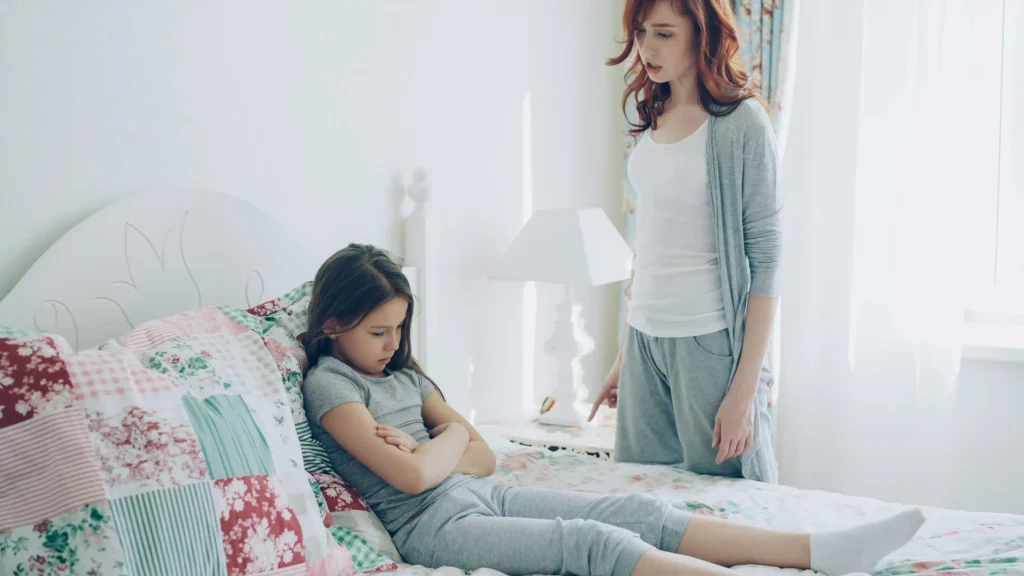Why is My Grown Daughter So Rude To Me? 9 Reasons Your Daughter is Rebellious
Watching your adult daughter treat you with disrespect hurts deeply. You gave her everything, raised her with love, and now she seems angry or distant whenever you interact.
Understanding the reasons behind her behavior doesn’t excuse rudeness, but it helps you respond more effectively.
Many parent-adult child conflicts stem from unresolved issues or changing relationship dynamics.
These insights can help you bridge the gap and rebuild a healthier, more respectful relationship with your grown daughter.
1. She’s Struggling to Establish Her Independence

Your daughter might act rudely because she feels you haven’t recognized her transition into adulthood.
She wants you to see her as an independent person capable of making her own decisions.
You may still treat her like a child by giving unsolicited advice, questioning her choices, or trying to solve her problems.
This behavior frustrates her because it undermines her autonomy and adult status.
She rebels against what feels like parental control or interference.
When you comment on her lifestyle, relationships, career choices, or personal decisions, she interprets this as you not respecting her maturity.
Her rudeness becomes a way to assert boundaries and demand recognition as an adult.
She pushes back strongly because she feels you’re not listening to her requests for space and independence.
2. Unresolved Childhood Issues Are Surfacing

Past hurts or disappointments from childhood often emerge when daughters reach adulthood.
She might harbor resentment about things that happened years ago that you’ve forgotten or minimized.
These could include feeling favored less than siblings, experiencing harsh discipline, or sensing that you were emotionally unavailable during crucial developmental periods.
Adult perspective allows her to process childhood experiences differently.
She may feel that you never acknowledged mistakes you made as a parent.
If you’ve never apologized for ways you hurt her or validated her childhood pain, those wounds remain open and affect your current relationship.
Her current rudeness might be displaced anger about past experiences.
She’s finally old enough to express feelings she couldn’t articulate as a child, though her delivery methods need improvement.
3. She Feels Judged or Criticized Constantly
You might unknowingly send messages that communicate disapproval of her life choices.
Comments about her appearance, career, relationships, or lifestyle decisions feel like constant criticism to her.
Even well-intentioned suggestions can feel judgmental when delivered frequently.
She interprets your advice as evidence that you think she’s incapable of managing her own life successfully.
Your facial expressions, tone of voice, or body language might convey disapproval even when your words seem supportive.
She picks up on subtle signs that you’re not pleased with her choices.
She responds rudely because she feels defensive and frustrated.
When someone feels constantly criticized, they often become hostile as a protective mechanism against further judgment.
4. You’re Not Respecting Her Boundaries
Your daughter may have clearly communicated boundaries that you continue to cross.
This could involve calling too frequently, visiting unannounced, or involving yourself in matters she considers private.
You might justify boundary violations by saying you’re just showing love and concern.
However, she experiences this as disrespectful intrusion into her adult life and personal space.
She’s expressed her limits verbally, but you dismiss them as unreasonable or hurtful.
When verbal communication fails to establish boundaries, some people resort to rudeness to enforce their limits more forcefully.
Her hostile behavior serves as a stronger boundary enforcement mechanism.
She escalates her responses because gentler approaches haven’t been effective in getting you to respect her stated boundaries.
5. She’s Dealing With Her Own Life Stress

Your daughter might be struggling with work pressure, relationship problems, financial stress, or other adult challenges.
Her rudeness toward you reflects her overall stress level rather than specific issues with your relationship.
You represent a safe target for her frustrations because she knows you’ll love her regardless.
She takes out her stress on you because she feels secure that your relationship can withstand her negative emotions.
She lacks healthy coping mechanisms for managing adult stressors.
Instead of addressing problems directly or seeking appropriate support, she displaces her anxiety and frustration onto family relationships.
Her rudeness increases during particularly challenging periods in her life.
Understanding this pattern helps you respond with compassion rather than taking her behavior personally.
6. Communication Patterns From Childhood Persist
You and your daughter might be stuck in dysfunctional communication patterns established during her teenage years.
These habits continue into adulthood even though both of you have grown and changed.
She might still communicate like a rebellious teenager because that’s the dynamic you both fall into when stress arises.
Neither of you has learned healthier ways to navigate disagreements or express concerns.
You may respond to her adult concerns with the same parenting approaches you used when she was young.
This triggers her to react with adolescent-style rebellion and defiance.
Breaking these patterns requires conscious effort from both parties.
Until someone changes the communication cycle, you’ll continue experiencing the same conflicts and hostile interactions.
7. She Feels You Don’t Really Know or Accept Her

Your daughter might believe that you love an idealized version of her rather than accepting who she actually is. She feels that your affection is conditional on her meeting your expectations.
You may have strong opinions about who she should be or what her life should look like.
When she deviates from your vision, she senses disappointment or withdrawal of support.
She experiences your attempts to change or improve her as evidence that you don’t genuinely like her authentic self.
This creates deep hurt and resentment that manifests as defensive rudeness.
Her hostile behavior becomes a test to see if you’ll love her even when she’s difficult.
She’s trying to determine whether your love is conditional or if you accept her completely.
8. Family Dynamics or Favoritism Issues
She might perceive favoritism toward siblings that creates ongoing resentment and competition.
Even if this favoritism is unintentional or imagined, her perception shapes her behavior toward you.
Comparisons between siblings, whether explicit or implied, damage her self-esteem and create anger toward you as the parent who makes these comparisons.
She feels that she has to compete for your attention, approval, or support in ways that her siblings don’t.
This creates a sense of injustice that fuels resentful behavior.
Family gatherings or discussions about siblings trigger her defensive responses.
Her rudeness intensifies when she feels her value within the family is being questioned or diminished.
9. She’s Modeling Behavior She Learned From You
Your daughter might be reflecting communication patterns she observed in your household during her formative years.
If rudeness, criticism, or hostile communication were normalized, she learned these as acceptable ways to express displeasure.
She may not realize that her communication style is inappropriate because it mirrors what she experienced growing up.
What feels normal to her might be shocking or hurtful to others.
You might have unintentionally modeled poor conflict resolution skills, emotional regulation problems, or disrespectful communication during her childhood.
She’s now using the same strategies she watched you employ.
This pattern often occurs unconsciously.
She doesn’t deliberately choose to be rude but falls back on familiar communication methods learned in childhood, even if they’re counterproductive.
Taking responsibility for your role in modeling these behaviors opens the door for more honest conversations about changing family communication patterns together.
How to Respond Constructively
Understanding these reasons helps you respond more effectively to your daughter’s rudeness.
Instead of reacting defensively or escalating conflicts, you can address underlying issues.
Start by examining your own behavior and communication patterns.
Consider whether you might be contributing to the dynamic through criticism, boundary violations, or outdated parenting approaches.
Open honest conversations about your relationship without being defensive.
Ask your daughter directly what she needs from you and listen without immediately justifying your behavior or dismissing her concerns.
Set clear expectations about respectful communication while also demonstrating the respect you want to receive.
Model the behavior changes you’d like to see in your relationship.
Consider family therapy if patterns are deeply entrenched.
A neutral professional can help both of you develop healthier communication skills and resolve longstanding issues that damage your connection.
Remember that rebuilding trust and respect takes time.
Consistent efforts to understand her perspective and modify your own behavior will gradually improve your relationship.
Your daughter’s rudeness often stems from unmet emotional needs or unresolved conflicts rather than lack of love for you. Addressing root causes creates opportunities for genuine healing and connection.
Be patient with the process while maintaining your own boundaries about acceptable treatment.
You can show understanding and work toward improvement without tolerating ongoing disrespect.
Conclusion
Your daughter’s rudeness likely reflects deeper issues than simple rebellion.
Understanding her perspective and examining your own behavior creates pathways toward healing your relationship.







